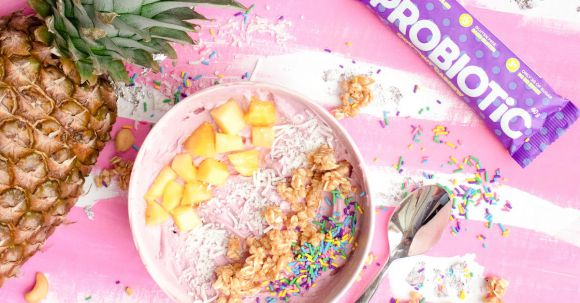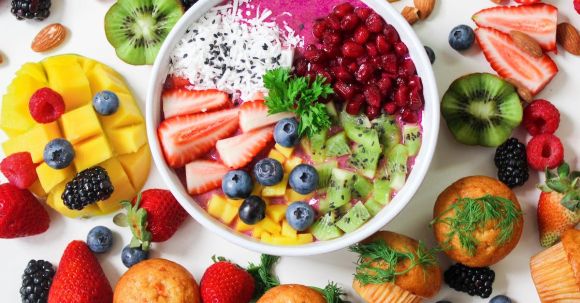Breakfast is often referred to as the most important meal of the day. It kickstarts our metabolism, fuels our brain, and provides us with the energy we need to tackle the day ahead. However, in the rush of our busy lives, it can be challenging to find the time to prepare a balanced and nutritious breakfast. Luckily, there are plenty of quick and healthy breakfast ideas that can be whipped up in no time. Here are some delicious options to get you started:
Nutrition and meal planning
Our metabolism plays a crucial role in maintaining a healthy weight and overall well-being. It determines how efficiently our bodies burn calories and convert them into energy. While genetics and age can have an impact on our metabolism, there are certain foods that can help to give it a natural boost. Incorporating these foods into your diet can not only aid in weight management but also improve your overall health. Here are the top 10 foods for boosting your metabolism.
Lean Protein
Protein is a vital nutrient for our bodies, and it has been proven to increase metabolism. Lean protein sources such as chicken, turkey, fish, tofu, and legumes are excellent choices. These foods require more energy to digest, thus increasing your metabolic rate and helping you burn more calories.Green Tea
Green tea is not only a refreshing beverage but also a metabolism booster. It contains a compound called catechin, which has been shown to increase metabolism and fat oxidation. Incorporating a cup of green tea into your daily routine can have a positive impact on your metabolism.Chili Peppers
If you enjoy spicy foods, you're in luck! Chili peppers contain a compound called capsaicin, which gives them their spicy flavor. Capsaicin has been found to increase metabolism and stimulate fat burning. So, adding a dash of chili peppers to your meals can give your metabolism a little extra kick.Whole Grains
Whole grains such as oats, brown rice, quinoa, and whole wheat bread are rich in fiber and complex carbohydrates. These foods take longer to digest, keeping you fuller for longer and preventing spikes in blood sugar levels. This helps to regulate your metabolism and promote healthy weight management.Berries
Berries are not only delicious but also packed with antioxidants and fiber. They have a low glycemic index, meaning they don't cause rapid spikes in blood sugar levels. This helps to keep your metabolism steady and prevent cravings. Blueberries, strawberries, raspberries, and blackberries are excellent choices to include in your diet.Greek Yogurt
Greek yogurt is a protein-rich snack that can help boost your metabolism. It contains probiotics, which are beneficial for gut health and digestion. A healthy gut is essential for a properly functioning metabolism, so incorporating Greek yogurt into your diet can have a positive impact on your overall metabolic rate.Caffeine
If you're a coffee lover, you'll be pleased to know that caffeine can actually increase your metabolism. It stimulates the nervous system and promotes the breakdown of fat cells. However, moderation is key, as excessive caffeine intake can have negative effects on your health. Enjoy your cup of coffee or tea, but remember to consume it in moderation.Leafy Greens
Leafy greens such as spinach, kale, and broccoli are excellent choices for boosting your metabolism. These vegetables are low in calories but high in fiber, making them a great addition to any weight-loss or healthy eating plan. They also contain minerals and vitamins that support your overall health and well-being.Water
Although not a food, water is essential for maintaining a healthy metabolism. Staying hydrated helps your body function optimally and supports the breakdown of fats. Ensure you drink enough water throughout the day to keep your metabolism running smoothly.Spices
Certain spices, such as ginger, cinnamon, and turmeric, have been found to have metabolism-boosting properties. They can increase your metabolic rate and promote fat burning. Adding these spices to your meals not only enhances the flavor but also supports a healthy metabolism. Incorporating these top 10 metabolism-boosting foods into your diet can have a positive impact on your overall health and weight management goals. Remember to focus on whole, nutrient-dense foods and maintain a balanced diet. As always, it's essential to consult with a healthcare professional or registered dietitian before making any significant changes to your diet or exercise routine.
Maintaining motivation throughout your health journey can be a challenge. It's easy to start strong, but as time goes on, motivation can wane. However, staying motivated is crucial to achieving your goals and living a healthier life. Here are some tips to help you stay motivated on your health journey.
Set Clear Goals
Setting clear goals is essential when it comes to staying motivated. Without a clear direction, it's easy to lose sight of why you started in the first place. Take some time to define your goals and make them specific, measurable, achievable, relevant, and time-bound (SMART). For example, instead of saying, "I want to lose weight," set a goal like, "I want to lose 10 pounds in the next three months by exercising five times a week and eating a balanced diet."Create a Vision Board
Visualizing your goals can be a powerful motivator. Create a vision board by collecting images, quotes, and words that represent your health goals and the lifestyle you want to achieve. Display your vision board somewhere visible, like your bedroom or office, so you can be reminded of your aspirations every day. This visual representation can inspire you to stay on track and make healthier choices.Find an Accountability Partner
Having someone to hold you accountable can significantly impact your motivation. Find a friend, family member, or even a coworker who shares similar health goals and commit to supporting each other. You can exercise together, share healthy recipes, and check in regularly to keep each other motivated and accountable. Knowing that someone is counting on you can be a powerful motivator to stay on track.Track Your Progress
Monitoring your progress can help you stay motivated by showing you how far you've come. Keep a journal or use a fitness app to track your workouts, food intake, and other health-related activities. Seeing your progress in black and white can boost your confidence and keep you motivated to continue making positive changes. Celebrate your milestones along the way to stay motivated and inspired.Reward Yourself
Rewarding yourself for reaching your goals is an excellent way to stay motivated. Set up a reward system where you treat yourself to something special when you achieve a specific milestone. It could be a massage, a new workout outfit, or a weekend getaway. Having something to look forward to can keep you motivated and give you a sense of accomplishment.Stay Positive
Maintaining a positive mindset is crucial to staying motivated on your health journey. Surround yourself with positive influences, whether it's uplifting music, motivational podcasts, or inspiring books. Practice positive affirmations and focus on the progress you've made rather than dwelling on setbacks. Remember that setbacks are part of the process, and every small step forward counts.Mix It Up
Repeating the same routine day after day can lead to boredom and decreased motivation. Keep things fresh and exciting by trying new activities and exercises. Sign up for a dance class, go for a hike, or take up a new sport. Trying new things not only keeps your health journey interesting but also challenges your body and mind in different ways. In conclusion, staying motivated on your health journey is vital to achieving lasting success. Set clear goals, create a vision board, find an accountability partner, track your progress, reward yourself, stay positive, and mix up your routine. Remember, motivation may fluctuate, but by implementing these strategies, you can stay on track and continue making progress towards a healthier and happier you.
Maintaining a healthy weight is essential for overall well-being, and understanding your daily calorie needs is a crucial step in achieving this goal. By knowing how many calories your body requires each day, you can make informed decisions about your diet and ensure that you are providing your body with the right amount of fuel. In this article, we will explore the simple yet effective methods to calculate your daily calorie needs.
Understanding Basal Metabolic Rate (BMR)
Basal Metabolic Rate (BMR) is the number of calories your body needs to perform basic functions at rest. It represents the energy required to maintain vital bodily functions such as breathing, circulation, and cell production. To calculate your BMR, you can use the Harris-Benedict formula, which takes into account your weight, height, age, and gender.Activity Level Multipliers
Once you have determined your BMR, you need to consider your activity level to calculate your total daily calorie needs. The activity level multipliers help adjust your BMR based on how active you are throughout the day. These multipliers range from sedentary (little to no exercise) to highly active (intense exercise or physical job), with several levels in between. Multiply your BMR by the appropriate activity level multiplier to get an estimate of your daily calorie needs.Tracking Your Caloric Intake and Adjusting
Calculating your daily calorie needs is just the first step. To maintain, lose, or gain weight, you need to monitor your caloric intake and make adjustments accordingly. If your goal is weight loss, aim for a caloric deficit by consuming fewer calories than your daily needs. Conversely, if you want to gain weight, you should aim for a caloric surplus by consuming more calories than your daily needs. Remember that a pound of body weight is approximately equal to 3,500 calories, so a deficit or surplus of 500 calories per day would result in a weight loss or gain of about one pound per week.Consider Nutritional Needs
While calories are important, it is equally essential to pay attention to the nutritional value of the foods you consume. A well-balanced diet should consist of macronutrients (carbohydrates, proteins, and fats) as well as micronutrients (vitamins and minerals). Ensure that your daily caloric intake includes a variety of nutrient-dense foods to meet your body's nutritional needs.Consult a Healthcare Professional
Calculating your daily calorie needs can be a helpful tool, but it is important to remember that everyone's needs are unique. Factors such as genetics, metabolism, and medical conditions can influence your calorie requirements. If you have specific health concerns or goals, it is advisable to consult a healthcare professional or registered dietitian who can provide personalized guidance and recommendations.Maintaining a Healthy Lifestyle
Knowing how to calculate your daily calorie needs is an empowering step towards maintaining a healthy lifestyle. By understanding the energy your body requires, you can make informed decisions about your diet and ensure that you are fueling your body optimally. Remember to incorporate regular physical activity, maintain a balanced diet, and listen to your body's cues to achieve and maintain a healthy weight.
Staying properly hydrated is crucial for maintaining overall health and well-being, but it becomes even more important when it comes to fitness. Whether you're an avid athlete or just starting out on your fitness journey, ensuring that you are adequately hydrated can greatly impact your performance and recovery. In this article, we will explore the significance of hydration for fitness and provide some tips on how to stay properly hydrated.
Optimal Performance
One of the key benefits of staying hydrated during exercise is the improvement in performance. Dehydration can have a negative impact on various aspects of physical performance, including strength, endurance, and speed. When you are dehydrated, your body's ability to transport oxygen and nutrients to the muscles is compromised, leading to muscle fatigue and decreased performance. Proper hydration allows your muscles to function optimally, enabling you to perform at your best. It helps maintain electrolyte balance, which is essential for muscle contractions and nerve function. By staying hydrated, you can enhance your stamina, power, and overall athletic performance.Prevention of Fatigue
Fatigue is a common issue that many individuals face during exercise. It can significantly hinder your ability to perform at your peak. One of the primary causes of fatigue is dehydration. When you are dehydrated, your blood volume decreases, making your heart work harder to circulate oxygen and nutrients throughout your body. This increased strain on your cardiovascular system can lead to feelings of exhaustion and fatigue. By staying properly hydrated, you can prevent dehydration-related fatigue and maintain your energy levels throughout your workout. This will allow you to push harder, train longer, and achieve better results.Improved Recovery
Proper hydration is not only essential during exercise but also plays a vital role in post-workout recovery. When you engage in physical activity, your body loses fluids through sweat. Replenishing these lost fluids is crucial for the recovery process. Hydration aids in the removal of waste products from your muscles and helps with the delivery of nutrients to promote muscle repair and growth. It also helps regulate your body temperature, which can be elevated during intense workouts. By drinking enough water, you can reduce muscle soreness, promote faster recovery, and minimize the risk of injury.Tips for Staying Hydrated
Now that we understand the importance of hydration for fitness, let's explore some practical tips to stay properly hydrated: 1. Drink water before, during, and after your workouts. Aim to consume at least 8 ounces of water before exercising and continue to hydrate throughout your session. 2. Monitor your urine color. Pale yellow urine indicates good hydration, while dark-colored urine suggests dehydration. 3. Consider incorporating sports drinks or electrolyte-replenishing beverages into your routine for more intense workouts lasting longer than an hour. 4. Eat water-rich foods such as fruits and vegetables to supplement your fluid intake. 5. Carry a water bottle with you throughout the day as a reminder to drink regularly.Conclusion
Staying properly hydrated is essential for maximizing your fitness potential. It improves performance, prevents fatigue, and aids in post-workout recovery. By following simple tips like drinking water before, during, and after exercise, monitoring urine color, and incorporating water-rich foods, you can ensure that you stay adequately hydrated. Remember, proper hydration is not just a matter of preference, but a necessity for achieving your fitness goals.
Finding meals that please every member of the family can be a challenge. With different tastes, preferences, and dietary restrictions, it can be difficult to come up with dishes that everyone will enjoy. However, with a little planning and creativity, it is possible to cook meals that will satisfy even the pickiest eaters. Here are some tips for cooking meals the whole family will love.
Plan Ahead
One of the keys to cooking meals that the whole family will love is to plan ahead. Take some time each week to sit down and plan out your meals. Consider the preferences and dietary restrictions of each family member, and come up with a menu that incorporates everyone's needs. This will not only make your grocery shopping more efficient, but it will also ensure that you have all the ingredients you need to prepare the meals.Variety is Key
No one wants to eat the same thing every day, so it's important to incorporate variety into your family meals. Try to include a mix of different proteins, such as chicken, beef, and fish, as well as a variety of vegetables and grains. This will not only keep your family interested in the meals, but it will also ensure that they are getting a balanced and nutritious diet.Get the Kids Involved
Getting your kids involved in meal planning and preparation can make them more excited about the food that is being served. Let them help pick out recipes, go grocery shopping with you, and even assist in the cooking process. Not only will this give them a sense of ownership over the meals, but it will also teach them valuable cooking skills that they can carry with them into adulthood.Experiment with Flavors
Don't be afraid to experiment with flavors when cooking for your family. Try out new spices, herbs, and sauces to give your meals a unique twist. This will not only add excitement to the dinner table, but it will also introduce your family to new flavors and cuisines. You never know, you might discover a new family favorite!Make it Fun
Making mealtime fun can go a long way in ensuring that the whole family enjoys the food. Consider having themed dinner nights, where you serve dishes from different cultures or cuisines. You can also try out new cooking techniques, such as grilling or baking, to add a fun twist to your meals. Additionally, involving your family in setting the table and creating a welcoming atmosphere can make mealtime a more enjoyable experience for everyone.Listen to Feedback
Lastly, it's important to listen to feedback from your family members. If a certain dish didn't go over well, take note of it and make adjustments for the future. Ask your family for their input on what they enjoyed and what they would like to see more of. This will not only help you improve your cooking skills, but it will also show your family that their opinions are valued. In conclusion, cooking meals that the whole family will love is possible with a little planning, creativity, and flexibility. By incorporating variety, getting the kids involved, experimenting with flavors, making it fun, and listening to feedback, you can create meals that will satisfy everyone's tastes and preferences. So, the next time you're in the kitchen, keep these tips in mind and get ready to wow your family with delicious and enjoyable meals.
When it comes to nutrition, there are countless myths and misconceptions that can often confuse people. From fad diets to conflicting advice, it can be difficult to separate fact from fiction. In this article, we will debunk some of the most common nutrition myths to help you make informed decisions about your health.
Myth: Carbs are bad for you
Carbohydrates have long been demonized as the enemy of weight loss and overall health. However, the truth is that not all carbs are created equal. While simple carbs like refined sugar and white bread can lead to spikes in blood sugar levels, complex carbs like whole grains and fruits provide essential nutrients and fiber. They are an important part of a balanced diet and can actually help with weight management when consumed in moderation.Myth: Fat makes you fat
For years, fat was seen as the culprit behind weight gain and heart disease. However, not all fats are created equal. While saturated and trans fats should be limited, healthy fats like those found in avocados, nuts, and olive oil are actually beneficial for your health. They provide essential fatty acids and help with nutrient absorption. Including moderate amounts of healthy fats in your diet can actually aid in weight loss and improve overall health.Myth: Skipping meals helps with weight loss
Many people believe that skipping meals is an effective way to shed pounds. However, this is far from the truth. Skipping meals can actually slow down your metabolism and lead to overeating later in the day. It is important to fuel your body with regular meals and snacks to maintain stable blood sugar levels and keep your energy levels up. Eating balanced meals throughout the day can help with weight management and prevent unnecessary cravings.Myth: All calories are created equal
The idea that all calories are the same, regardless of their source, is a common misconception. While it is true that weight loss ultimately comes down to calorie balance, the quality of those calories is equally important. Nutrient-dense foods like fruits, vegetables, and lean proteins provide essential vitamins and minerals that are vital for overall health. On the other hand, empty calories from sugary drinks and processed foods can lead to weight gain and nutrient deficiencies.Myth: Supplements can replace a healthy diet
With the rise of the supplement industry, many people believe that popping a few pills can make up for a poor diet. However, supplements should never be seen as a substitute for a balanced diet. While certain supplements may be necessary for specific individuals, such as vitamin D for those with limited sun exposure, they should always be used in conjunction with a healthy eating plan. Whole foods provide a wide range of nutrients that work synergistically to support optimal health. In conclusion, it is important to separate fact from fiction when it comes to nutrition. Carbs are not inherently bad, healthy fats are beneficial, skipping meals is not a sustainable weight loss strategy, not all calories are created equal, and supplements cannot replace a healthy diet. By debunking these common myths, we can make informed choices about our nutrition and improve our overall health. Remember, a balanced diet that includes a variety of whole foods is the key to nourishing your body and achieving optimal wellness.
Eating out can be a challenge when you're trying to maintain a healthy lifestyle. With so many tempting options and hidden calories, it's easy to derail your diet goals. However, with a little planning and smart choices, you can still enjoy dining out without sacrificing your health.
1. Research the Menu
Before heading to a restaurant, take a few minutes to look up their menu online. This will give you a chance to review the options and identify healthier choices. Look for dishes that are grilled, baked, or steamed instead of fried. Also, pay attention to portion sizes and opt for smaller portions or share a meal with a friend if necessary.2. Watch Out for Hidden Calories
When dining out, it's important to be mindful of hidden calories. Many dishes may appear healthy but are loaded with added sugars, unhealthy fats, and excessive sodium. Avoid dishes that are heavily sauced or creamy, as these tend to be higher in calories. Instead, opt for meals that are prepared with fresh ingredients and simple seasonings.3. Control Your Portions
Portion sizes at restaurants are often much larger than what you would typically eat at home. To avoid overeating, consider sharing a meal with a friend or ask for a takeout container when your food arrives and pack up half of your meal to enjoy later. Another option is to order an appetizer or a small plate as your main course, as these are usually more reasonably sized.4. Choose Healthier Cooking Methods
When it comes to cooking methods, some are healthier than others. Opt for dishes that are grilled, baked, or steamed instead of fried. These cooking methods reduce the amount of added fats and calories, making your meal healthier overall. If you're unsure about how a dish is prepared, don't hesitate to ask your server.5. Be Mindful of Beverages
Beverages can be a hidden source of calories and sugar. Avoid sugary drinks such as soda, sweetened iced tea, and fruit juices. Instead, opt for water, unsweetened tea, or sparkling water with a splash of citrus for flavor. If you prefer alcoholic beverages, choose light options like a glass of wine or a low-calorie beer.6. Load Up on Vegetables
Most restaurants offer a variety of vegetables as sides or in salads. Take advantage of these options and load up on vegetables to increase your nutrient intake. Choose steamed or roasted vegetables instead of those cooked in butter or oil. Also, ask for dressings and sauces on the side, so you have control over how much you use.7. Practice Mindful Eating
Eating out often involves socializing and distractions, which can lead to mindless eating. Practice mindful eating by paying attention to your hunger and fullness cues. Take your time to savor each bite and chew slowly. Put your fork down between bites and engage in conversation to slow down your eating pace. Conclusion: Eating out doesn't have to mean abandoning your healthy eating habits. By doing a little research, making smart choices, and practicing mindful eating, you can enjoy dining out while still staying on track with your health goals. Remember, moderation is key, and it's okay to indulge occasionally. With these tips in mind, you can navigate restaurant menus with confidence and make choices that align with your healthy lifestyle.
The human gut is home to trillions of microorganisms, collectively known as the gut microbiota. These microorganisms play a crucial role in maintaining our overall health and well-being. Probiotics, often referred to as "good" bacteria, are live microorganisms that can provide numerous benefits to our gut health. In this article, we will explore the benefits of probiotics and how they can help improve our overall well-being.
Improving Digestive Health
One of the primary benefits of probiotics is the improvement of digestive health. Probiotics help to maintain a healthy balance of bacteria in the gut, which is essential for proper digestion. They can aid in the breakdown and absorption of nutrients, reduce symptoms of digestive disorders such as diarrhea and constipation, and improve overall gut motility.Boosting Immune Function
Did you know that a significant portion of our immune system resides in our gut? Probiotics play a crucial role in supporting immune function. They help to stimulate the production of antibodies, enhance the activity of immune cells, and regulate inflammation in the gut. By maintaining a healthy gut microbiota with the help of probiotics, we can bolster our immune system and reduce the risk of infections and diseases.Managing Weight
Maintaining a healthy weight is not just about counting calories and exercising regularly. The gut microbiota also plays a role in weight management, and probiotics can assist in this area. Certain strains of probiotics have been shown to increase the production of hormones that regulate appetite and satiety, helping to reduce overeating and promote weight loss.Promoting Mental Well-being
Believe it or not, there is a strong connection between our gut and our brain. This connection is known as the gut-brain axis, and it influences our mood, emotions, and mental well-being. Probiotics have been found to have a positive impact on mental health by reducing symptoms of anxiety, depression, and stress. They do this by producing neurotransmitters and other compounds that influence brain function.Enhancing Skin Health
Your skin is a reflection of your internal health, and the health of your gut microbiota can significantly impact the appearance of your skin. Probiotics can help improve skin health by reducing inflammation, supporting the production of collagen, and balancing the skin's pH levels. They can also alleviate symptoms of skin conditions such as acne, eczema, and rosacea.Maintaining Heart Health
Heart disease is a leading cause of death worldwide, and maintaining a healthy heart is of utmost importance. Probiotics have been shown to have beneficial effects on cardiovascular health. They can help lower blood pressure, reduce levels of bad cholesterol, and improve overall heart function. By including probiotics in your diet, you can take a proactive approach to maintaining a healthy heart.Conclusion
In conclusion, probiotics offer a wide range of benefits for our gut health and overall well-being. From improving digestive health and boosting immune function to promoting mental well-being and enhancing skin health, probiotics have a profound impact on our bodies. By incorporating probiotic-rich foods such as yogurt, sauerkraut, and kimchi into our diets or taking probiotic supplements, we can support the health of our gut microbiota and reap the many benefits that probiotics have to offer. So, take care of your gut, and it will take care of you!
The Mediterranean diet has become increasingly popular in recent years, and for good reason. This eating plan is inspired by the traditional diets of countries like Greece, Italy, and Spain, and is known for its emphasis on fresh fruits and vegetables, whole grains, lean proteins, and healthy fats. In this article, we will explore the many benefits of following a Mediterranean diet.









